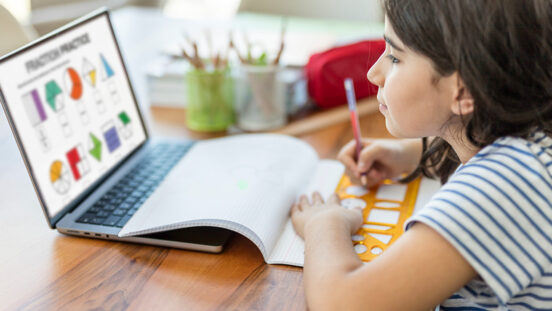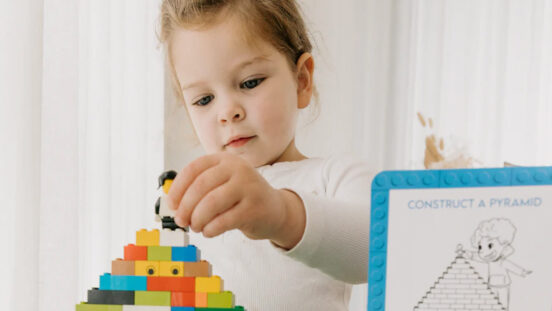Busting at-home learning myths amid COVID-19
#1 You don't need to be the best teacher ever
Is your homeschooling situation feeling impractical, unfeasible and more ludicrous than quality learning?
Dr Selina Samuels has been designing remote and online education programs since 2013 and breaks down a few of the most common barriers to helping our kids at home below …

Dr Selina Samuels is the Chief Learning Officer at online education company Cluey Learning.
1. You need to be the best teacher ever
Parenting can be surprisingly competitive, particularly in these days of social media and influencers. Please liberate yourself from unreasonable expectations. We’re in the midst of a pandemic. You’re probably working from home in your normal job, not to mention supervising your child’s education.
Don’t place the additional burden on yourself to be the best teacher your child has ever had. You’re not a teacher, and even if you actually are a teacher, you’re not your child’s teacher. Remember that your child’s teachers see a different person to the one that you live with. With their teachers, children behave differently. They may be more shy or more outgoing. They’ll probably (hopefully) be more polite. Just because your child doesn’t thank you for your help, doesn’t mean they haven’t appreciated it or found it useful.

Go easy on yourself, nobody is expecting you to be a perfect teacher.
2. You can’t possibly help your child if you were terrible in that subject at school
Well, for a start, please don’t tell your child, “I was terrible at Maths”. Better to say, “I never really gave myself enough time to understand Maths” or “I regret that I didn’t apply myself more in Maths”.
We’re all more confident in some areas than others. If Maths (or any other subject) wasn’t really your thing, remember that schools will be providing teaching material and you won’t be expected to generate it all yourself. Instead, try something like, “I reckon that if we work together, I’ll get better at Maths.”
If you suspect that your child has a better grasp of the subject than you do, this is a perfect opportunity to get them to teach it to you. The best way to learn is to teach; not only will teaching you consolidate their understanding, it will also build their confidence and communication skills.
WATCH: Countess Sophie urges parents not to feel alone and shares homeschooling resources amid Covid-19. Continues after video …
3. You’re a homeschool teacher
There’s no point pretending that your children will be going to school… just at home. For many, if not most families, the current situation is not even homeschooling because your children are still being educated by their teachers.
The best way to think about this is “learning from home”. That means that the role that parents are playing most of the time is that of facilitator or supporter. Rather than being responsible for the direct teaching of concepts, you’re more likely to be called upon to help your child navigate an assignment or understand instructions. Your focus should be on creating the right environment for learning, rather than feeling that all the teaching falls on your shoulders.
4. Play is fun but learning is serious
Learning is certainly a serious matter, but it doesn’t have to feel serious. Don’t think that the only time your child is learning is when they’re silent, still and frowning. In fact, the more fun that children have while they’re learning, the better.
When we’re having fun, our brains release more dopamine (the happy hormone), which helps us to associate whatever we’re doing at the time with a sense of pleasure. If children find learning pleasurable, they’re more likely to seek out opportunities to learn throughout their lives.
Learning at home, with the inevitable need to improvise and be creative, is a great time to foster a love of learning. By the same token and particularly for younger children, play often is learning.
A useful way to assess if play involves learning is to ask yourself these questions:
- Is my child solving problems productively?
- Is my child applying something that they’ve learned to a new situation or context?
- Is my child required to be persistent?
- Is my child learning skills like resilience or delayed gratification?
- Is my child acquiring skills such as collaboration and communication?
5. Screen time is the enemy
It’s not surprising that parents are raising concerns about the amount of screen time that school children access. However, it’s important to make a distinction between screen time for learning and screen time for playing. Technology is a great connector of people – as we’re all discovering at the moment! At Cluey, we believe in the importance of using technology to connect students and tutors in real time so that learning can be individualised and adaptive. That use of technology – to connect and humanise – is fundamentally different from playing endless games. So, when you’re thinking about how your child is using technology, ask yourself: is it a distraction or a pacifier, or is it a human connector and a window to learning?
At the end of the day (and at the beginning of the next day, and the one after that), it’s important not to put too much pressure on yourself. Work through as much of the assigned content as you can with your child and don’t feel like the responsibility for creating and teaching everything rests solely on you. Just do the best you can to get through the day. And if you need support for a couple of hours a week, professionals like Cluey have your back.




